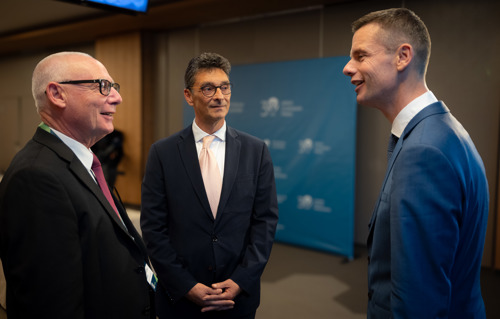Parliamentary Ombudsman participates in high-level conference on the effectiveness of Ombudsman Institutions and NHRIs
Published December 05, 2024

The Parliamentary Ombudsman of Malta, Judge Emeritus Joseph Zammit McKeon, is participating in the Bled Conference on the Effectiveness of Ombudsman Institutions and National Human Rights Institutions (NHRIs) in tackling contemporary challenges.
The event, hosted by the Human Rights Ombudsman of the Republic of Slovenia, marks the 30th anniversary of the Slovenian Ombudsman's office. The high-level conference brings together heads of institutions, international and national experts, practitioners, and policymakers to discuss the effectiveness of Ombudsman Institutions and NHRIs in addressing modern human rights challenges.
The main objectives of the conference are to assess the current effectiveness of these institutions, explore innovative approaches to enhance their impact and promote cooperation among national and international human rights mechanisms. The discussions aim to identify and address emerging human rights challenges related to digital transformation, artificial intelligence, climate crises, migration, and ageing societies. The conference serves as a platform for exchanging best practices, successful case studies, and innovative strategies to strengthen the promotion and protection of human rights.
Peter Svetina, the Human Rights Ombudsman of Slovenia, welcomed the participants, emphasising the importance of respecting the decisions of institutions that uphold the dignity and fundamental freedoms of every individual. He highlighted that strong, professional, independent, and effective Ombudsman Institutions and NHRIs are benchmarks of the rule of law and essential cornerstones of democracy, as noted in the European Commission's annual rule of law reports.
The conference was officially opened by H.E. Urška Klakočar Zupančič, President of the National Assembly of the Republic of Slovenia. In her address, she emphasised that fundamental human rights are not merely words on paper. To become an inclusive and tolerant community that coexists peacefully with others, she highlighted the necessity of raising awareness and accepting these rights as shared core values. She noted that making society aware of human rights violations is one of the significant challenges we face. She also reflected on history, observing that achievements in human rights have often not been gifts freely given but secured through struggle and, at times, bloodshed. She appealed for society to stop adopting double standards regarding human rights, urging that societies cannot remain silent but must be vocal in their daily efforts to protect the human rights of every person. Furthermore, she underscored that institutions dedicated to protecting human rights are not only responsible for acting effectively to safeguard the rights of individuals or groups but are also fundamental to the changes that the international community must adopt and implement for the long-term survival of civilisation.
In a video message, Prof. Michael O’Flaherty, Commissioner for Human Rights of the Council of Europe, underscored the essential role of Ombudsman Institutions and National Human Rights Institutions in maintaining a healthy and thriving democratic state. He noted that when these institutions are integrated, they create something exceptional. Putting human rights at the heart of the ombuds institution affords a roadmap to deliver on the essential ombuds function, but also having the National Human Rights element built into it further expands the scope, the breadth of activity and engagement in a way that can only be good for people on the streets.
The opening ceremony continued with a keynote address by H.E. Dr. Marko Bošnjak, President of the European Court of Human Rights. He observed that Ombudsman Institutions and NHRIs continually face new and emerging human rights challenges, particularly in areas such as climate change and the digital landscape. He stressed the need for these institutions to innovate their practices to keep pace with contemporary society and enhance their impact and effectiveness.
The conference proceeded with a panel discussion on "Effective Human Rights Advocacy – Is There a Need to Enhance the Impact and Effectiveness of Ombudsman Institutions and NHRIs?" The panel examined the current landscape of human rights advocacy, focusing on the roles and effectiveness of Ombudsman Institutions and NHRIs, including their additional mandates as National Preventive Mechanisms, Equality Bodies, Ombudspersons for Children, or independent bodies monitoring the rights of persons with disabilities. The panel comprised Dr Milan Brglez, State Secretary at the Ministry of Justice of the Republic of Slovenia and former Member of the European Parliament; Dr Andreas Pottakis, Greek Ombudsman; Maria Lúcia Amaral, Portuguese Ombudsman; and Anahit Manasyan, Human Rights Defender of Armenia. The discussion was moderated by Prof. Dr. Jernej Letnar Černič, Professor of Human Rights and Constitutional Law.
The second panel focused on "The Role of Ombudsman Institutions and NHRIs in Protecting Human Rights in the Digital Era." The panel delved into the critical role these institutions play in safeguarding human rights within the rapidly evolving digital landscape, addressing challenges posed by digital transformation. Topics discussed included artificial intelligence and human rights, digital inclusion and equality, freedom of expression and fake news, cybersecurity and human rights, and privacy and data protection. The panel featured Reinier van Zutphen, National Ombudsman of the Netherlands and President of the European Board of Directors of the International Ombudsman Institute (IOI); Adv. Kholeka Gcaleka, Public Protector of South Africa and President of the African Board of Directors of the IOI; Marina Ceyssac, High Commissioner for the Protection of Rights, Liberties and Mediation of the Principality of Monaco; and Prof. Dr. Marko Grobelnik, AI researcher. The panel was moderated by Erinda Ballanca, People's Advocate of the Republic of Albania and Second Vice-President of the Association of Mediterranean Ombudsmen.
The Parliamentary Ombudsman Zammit McKeon will address the conference on the second day during the panel discussion "Ombudsman Institutions Addressing Complex Human Rights Challenges—Climate Crisis, Migration, and Ageing Society."
Download the conference booklet for more details on the conference and interventions.